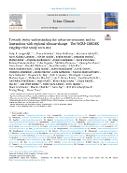Towards better understanding the urban environment and its interactions with regional climate change - The WCRP CORDEX Flagship Pilot Study URB-RCC

Autor
Langendijk, Gaby S.
Hoffmann, Peter
Adinolfi, Marianna
Campino, Aitor Aldama
Asselin, Olivier
Bastin, Sophie
Bechtel, Benjamin
Bushenkova, Angelina
Campanale, Angelo
Chun, Kwok Pan
Constantinidou, Katiana
Coppola, Erika
Demuzere, Matthias
Doan, Quang-Van
Evans, Jason
Feldmann, Hendrik
Fernandez, Jesus
Fita, Lluis
Hadjinicolaou, Panos
Hamdi, Rafiq
Hundhausen, Marie
Grawe, David
Johannsen, Frederico
Milovac, Josipa
Katragkou, Eleni
Kerroumi, Nour El Islam
Kotlarski, Sven
Le Roy, Benjamin
Lemonsu, Aude
Lennard, Christopher
Lipson, Mathew
Mandal, Shailendra
Munoz Pabon, Luis E.
Pavlidis, Vassileios
Pietikaeinen, Joni-Pekka
Raffa, Mario
Raluy-Lopez, Eloisa
Rechid, Diana
Ito, Rui
Schulz, Jan-Peter
Soares, Pedro M. M.
Takane, Yuya
Teichmann, Claas
Thatcher, Marcus
Top, Sara
Van Schaeybroeck, Bert
Wang, Fuxing
Yuan, Jiacan
Datum vydání
2024Publikováno v
Urban ClimateRočník / Číslo vydání
58 (listopad 2024)ISBN / ISSN
ISSN: 2212-0955Informace o financování
UK/COOP/COOP
EU/FP9/FOCI
EU/FP9/Impetus4Change
Metadata
Zobrazit celý záznamKolekce
Tato publikace má vydavatelskou verzi s DOI 10.1016/j.uclim.2024.102165
Abstrakt
High-quality climate information tailored to cities' needs assists decision makers to prepare for and adapt to climate change impacts, as well as to support the targeted transition towards climate resilient cities. During the last decades, two main modelling approaches emerged to understand and analyse the urban climate and to generate information. Firstly, meso- and microscale urban climate models commonly resolve the street to city scale climate (1 m to 1 km) through simulating short "weather" type episodes, possibly under climate change conditions. Secondly, regional climate models (RCMs) are currently approaching the kilometer scale grid resolutions (1-4 km) and becoming increasingly relevant to understand the interactions of cities with the regional climate on timescales from decades up to a century. Therefore, the WCRP CORDEX Flagship Pilot Study "URBan environments and Regional Climate Change (FPS URB-RCC)" brings together the urban climate modelling community and the RCM community and focuses on understanding the interactions between urban areas and regional climate change, with the help of coordinated experiments with an RCM ensemble having refined urban representations. This paper presents the FPS URB-RCC, its main aims, as well as the initial steps taken. The FPS URB-RCC advances urban climate projections and information to support evidence-based climate action towards climate resilient cities.
Klíčová slova
Urban areas, Regional climate models, Coordinated experiment, URB-RCC, Kilometer scale modelling,
Trvalý odkaz
https://hdl.handle.net/20.500.14178/2936Licence
Licence pro užití plného textu výsledku: Creative Commons Uveďte původ 4.0 International






